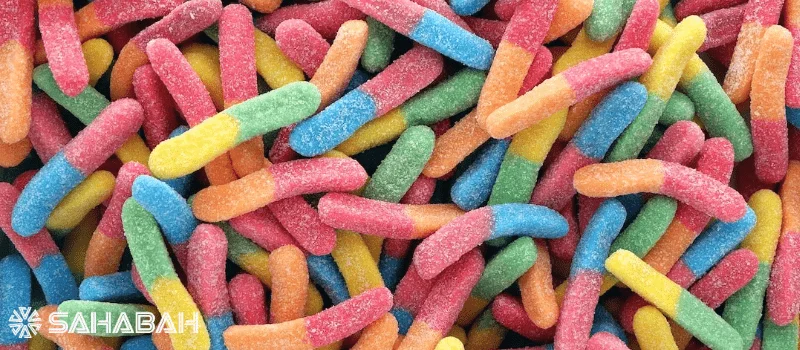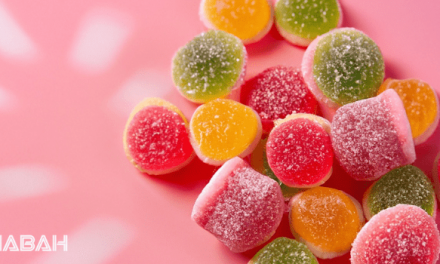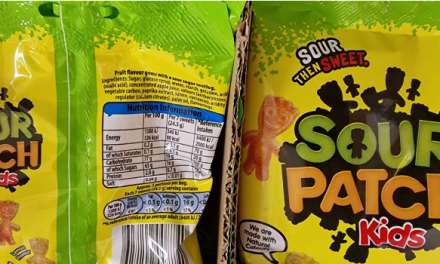As a muslim consumer who values transparency and wants to make informed choices, I was curious to delve into the halal status of Squashies Drumstick. In this article, I will uncover the truth behind Squashies’s halal certification, providing you with the knowledge you need to confidently enjoy these delectable treats.
Just How Halal Are These Nostalgic Sweets
Squashies are a popular chewy candy in the shape of ice cream cones produced by the British confectionery company Swizzels. First launched in the 1990s, Squashies have become a favorite treat for kids and adults alike in the UK.
But are Squashies halal? Many Muslims in Britain and beyond are eager to know if these sweets adhere to Islamic dietary regulations. This article will examine:
- What exactly Squashies are made of
- The key ingredients and manufacturing processes involved
- How these details stack up against halal requirements
- Perspectives from different sources on Squashies’ halal status
- How Muslim consumers might evaluate Squashies for themselves
We’ll review statements from the manufacturer, ingredient labels, and comments from online discussions to reach a well-rounded conclusion. There is debate around whether Squashies definitively meet halal standards, especially given:
- Uncertainty around the exact source of gelatin used
- Lack of halal certification for the production process
By objectively assessing the evidence from multiple angles, this article will provide useful guidance for Muslim consumers debating whether enjoying Squashies is halal or not.
Background on Halal Food Requirements
For a food to be considered halal, it must comply with Islamic dietary regulations. The Quran outlines specific prohibitions on certain types of food and drink:
He has only forbidden to you dead animals, blood, the flesh of swine, and that which has been dedicated to other than Allah. But whoever is forced [by necessity], neither desiring [it] nor transgressing [its limit] – then indeed, Allah is Forgiving and Merciful.
Based on these verses and hadiths, jurists have established the following key requirements for halal food preparation:
-
No pork or pork byproducts: Pork and pork-based ingredients like gelatin or rennet sourced from pigs are completely forbidden.
-
Meat must come from animals slaughtered according to Islamic law: Known as zabiha, the animal must be killed by hand and blessed in the name of Allah.
-
No alcohol or intoxicants: Any food or drink containing alcohol or other intoxicating substances is prohibited. This includes dishes cooked with wine or liquor.
-
Food prepared, processed, and stored using utensils, equipment, and machinery that have been cleansed according to Islamic law: Anything that comes into substantial contact with haram (non-halal) substances, including pork and alcohol, must be thoroughly cleaned before being used for halal food.
Meeting these conditions is essential for food to be certified halal and permissible for observant Muslims to consume.
Evaluating the Ingredients of Squashies
To determine if Squashies are halal, we need to examine the ingredients and production process closely.
According to the Swizzels website, the key ingredients in Squashies are:
- Sugar
- Glucose Syrup
- Water
- Fruit Juices from Concentrate (1%)
- Acids (Citric Acid, Malic Acid)
- Colours ( Anthocyanins, Paprika Extract)
- Flavourings
- Gelatine
- Palm Oil
- Carnauba Wax
The gelatine used in Squashies seems to be the main potential issue from a halal standpoint. Gelatine is a gelling agent derived from collagen typically sourced from pork, cattle, or fish.
Since no pork products are listed, the gelatine likely comes from cattle or fish stock, which would generally be considered halal. However, the exact source is not specified by Swizzels. Without knowing the precise origin of the gelatine, it’s difficult to say definitively whether it meets halal standards.
Additionally, the manufacturing process for Squashies is not certified halal. So while the ingredients may be halal, cross-contamination could occur during production.
Overall, Squashies appear to be made of halal ingredients, but uncertainty around the gelatine source and lack of halal oversight during manufacturing raise some questions. More transparency from the company would be needed to remove any doubt.
Perspectives on Drumstick Squashies Halal Status
There are mixed opinions online regarding whether Squashies are definitively halal or not.
On Amazon’s Q&A for Squashies, one user asks “Are these halal?”. A reply states:
All ingredients used to make Drumstick Squashies are halal suitable. The gelatine we use is derived from beef.
This provides confirmation that the gelatine source is halal. However, other users point out that without formal halal certification, doubts remain:
Even if the gelatine is from halal sources, it still needs to be certified because the cross contamination risk is always there when not produced in 100% halal environment.
On the website Ehalal, the conclusion is that:
Ingredients wise, Drumstick Squashies seem to be Halal but not Halal certified. It is better to avoid it or look for a Halal certified options.
So there are reasonable arguments on both sides – some believe the informal assurance from Swizzels is sufficient, while others argue that formal halal certification is required for full compliance.
Are Squashies Vegan
Squashies, like many other candies or sweets, may not be considered vegan due to the potential presence of ingredients like gelatin, which is derived from animal sources, or other animal-based additives such as beeswax. The specific vegan-friendliness of Squashies can vary depending on the flavor and manufacturer.
If you are following a vegan diet, it’s essential to carefully examine the ingredient list on the packaging of the specific Squashies product you are interested in purchasing. Manufacturers may change their ingredients over time, so always double-check to ensure that the product meets your vegan dietary requirements. If you have any doubts or questions about the vegan status of a particular Squashies product, you can also reach out to the manufacturer directly for up-to-date information.
How to Take a Cautious Approach
For Muslims trying to strictly follow halal dietary rules, the lack of certification and transparency around Squashies’ production may be cause for caution. Here are some tips on how to take a careful approach:
-
Contact the manufacturer for more details: Swizzels customer service could be contacted to ask additional questions about the gelatin source, production methods, and possibility of cross-contamination. This extra information could provide more assurance.
-
Avoid Squashies if halal status seems uncertain: When in doubt, it may be best to avoid consuming Squashies until halal compliance is definitively confirmed. This is the most conservative option.
-
Look for certified halal alternative sweets: Many major candy brands now offer certified halal gummy and chewy sweets, including:
- Haribo Gold Bears
- Halal Guys Fruit Gums
- Trolli Sour Brite Crawlers
Choosing certified halal alternatives may provide greater peace of mind for those wanting to exercise caution around Squashies.
Frequently Asked Questions: Are Squashies Halal?
What are Squashies?
Squashies are a popular sweet product created by Swizzels which are known for their chewy, fruity texture and unique flavors.
Are Squashies halal?
Yes, Squashies are considered halal. They do not contain any pork gelatine or ingredients derived from forbidden animals.
Which ingredients are used in Squashies?
Squashies typically include ingredients such as glucose syrup, sugar, acidity regulators (such as citric acid), flavouring, and colour. They are free from animal derivatives.
Are Squashies suitable for vegetarians?
Yes, Squashies are vegetarian-friendly as they do not contain any animal-derived ingredients.
Do Squashies contain pork gelatine?
No, Squashies do not contain any pork gelatine.
Where can I buy Squashies?
You can buy Squashies from various retail stores, supermarkets, and online platforms that stock confectionery products.
Are there any Squashies flavors that are not halal?
No, all the flavors of Squashies, including their popular variants like raspberry and milk or apple, are halal-certified and safe to consume.
Do Squashies come in a variety of options?
Yes, Squashies come in a variety of flavors and textures, offering a wide selection for those who enjoy chewy, fruity treats.
Can I contact Swizzels for more information?
Yes, if you have any specific questions or concerns about the halal status of Squashies or any other Swizzels products, you can contact their customer service team via email or their official website. Their customer service representatives
Conclusion
In summary, the halal status of the popular British candy Squashies is questionable according to some interpretations of Islamic dietary laws.
While Squashies do not contain any overtly prohibited ingredients like pork, the lack of transparency around the gelatin source and manufacturing process raises doubts. The company states the gelatin comes from beef, but without formal halal certification, this assurance may not be sufficient for some Muslim consumers.
Overall, ingredients-wise Squashies are likely in compliance with halal standards. However, the production process itself is not guaranteed to be free from cross-contamination. So Muslims who wish to exercise great caution could avoid Squashies until more details are provided or halal certification obtained.
For those who are less strict, the informal statement from the manufacturer may provide adequate reassurance. But there are also many certified halal gummy candy alternatives available for those wanting guaranteed compliance.
In the end, each Muslim consumer will have to evaluate the evidence and decide where Squashies fit into their own interpretation of halal dietary rules. This outline has hopefully provided a balanced and thorough assessment of the key factors involved in making this determination.





